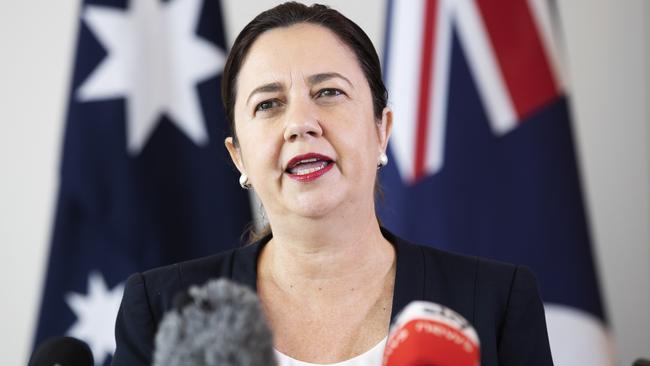‘Multiple flaws’ amid Brisbane hotel quarantine coronavirus outbreak
The UK strain of coronavirus escaped from Queensland’s hotel quarantine system due to ‘multiple weaknesses’ in infection control.

The UK strain of coronavirus escaped from Queensland’s hotel quarantine system due to “multiple weaknesses” in infection control, forcing an overhaul of cleaning, CCTV and hygiene protocol.
Six people contracted COVID-19 in the Hotel Grand Chancellor cluster last month, including a cleaner who became the first case of the virus leaping into the community from one of the state’s 74 quarantine hotels.
The outbreak sparked a snap three-day lockdown of greater Brisbane as authorities scrambled to track down and test the cleaner’s close contacts.
A police and health department report into the outbreak failed to identify the exact cause of the transmission, but said no worker or guest breached protocol and no one would be charged over the cluster. However, the investigation determined the cluster was “most likely to be the result of multiple weaknesses in infection prevention and control”, and that it was likely transmitted on surfaces. Investigators warned they had identified “less than optimal” practices, especially relating to personal protective equipment, knowledge, and room-cleaning procedures.

The review found traces of the virus remained after a guest room was cleaned, and hotel staff did not have access to hand sanitiser in rooms between glove changes.
The Queensland government will now implement a raft of recommendations, including an overhaul of cleaning practices, requiring guests to wear masks when they open their doors, and limiting the number of times rooms have to be opened.
Queensland Health director-general John Wakefield said the hotel quarantine system had largely been effective, with nearly 65,000 people having been accommodated in 74 hotels in a year.
The Grand Chancellor worker is the first hotel staffer to be infected in Queensland.
“This is not a bunch of failures … it’s a bunch of opportunities to say we’re dealing with a new virus that is more infectious, we need to ramp up our risk controls,” Dr Wakefield said.
But opposition health spokeswoman Ros Bates said the report revealed failures in the “basics of infection control”.
“These failures are the reason more than two million Queenslanders were sent into lockdown,” Ms Bates said.
Chief health officer Jeannette Young said the findings of the report would be discussed by the country’s other top medicos involved in the Australian Health Protection Principal Committee, and some changes might be introduced nationally.
The investigators recommended CCTV be installed in quarantine hotel venues to monitor movements in and out of guest rooms. The deep cleaning process — required after a hotel guest tests positive — will be reviewed and will require swabbing of walls and other high-touch surfaces after the clean. Guests will be required to open their doors less frequently and will have to put on masks 10 minutes before staff enter their rooms. Quarantine hotels are also being told to ensure air extraction and ventilation of corridors.
The Hotel Grand Chancellor cluster consisted of three pairs of people: four returned international travellers in two separate groups, and a hotel cleaner and her partner.
The first diagnosed was a traveller who had returned via Doha, Qatar, testing positive on January 3.




To join the conversation, please log in. Don't have an account? Register
Join the conversation, you are commenting as Logout